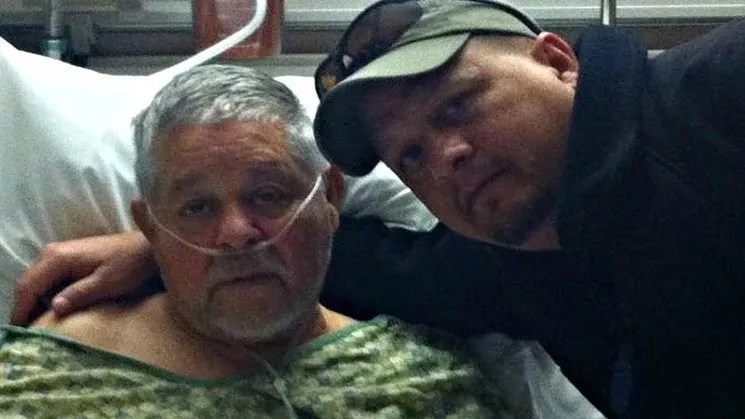
Courtesy of Bobby Espinoza

Audio By Carbonatix
Attorney Mike Burg of the Denver-based law firm Burg Simpson recently won a $58 million verdict for ten of 21 plaintiffs who sued the owner of a body-donation facility in Phoenix described as a human butcher shop. But Burg says the facts of the case at the center of two separate lawsuits filed against Montrose’s Sunset Mesa funeral home “are even more egregious.”
According to Burg, Megan Hess, Sunset Mesa’s owner, and her associates, including her parents, Alan and Shirley Koch, “didn’t even try to get any type of consent. In other words, the people who brought their loved ones in to be cremated had no idea that she was taking those bodies and selling them out the back door either in whole or in part.” (Hess has not responded to multiple interview requests from Westword.)
The lawsuits filed by Burg Simpson earlier this year – the first in February, the second in June – are filled with horror stories told by approximately fifty plaintiffs, including Bobby Espinoza, who believed the remains of Jerry Espinoza, his father, had been cremated at Sunset Mesa until being informed otherwise by representatives of the FBI following a raid on the facility. The complaint alleges that “Jerry Sr.’s body had been dismembered and sold for parts.” Defendants “carved off his head and his legs from his body and severed his torso and pelvis. These parts were then sold piecemeal to three different body-buyer defendants.”
Equally grisly details emerged from investigation of Biological Resource Center of Arizona, whose owner, Steve Gore, pleaded guilty to taking part in a criminal enterprise back in 2015. Gore “opened up BRC in 2004, and he had no medical training,” Burg points out. “I understand that for a while he was involved in recovering corneas for transplantation from an eye institute. But he then got the idea that he could open a whole body donation company, which he, his brother and a college friend began to operate out of Phoenix, and he was able to do it because while organ donation is highly regulated – there are a lot of rules you have to follow both federally and in states – whole-body donation at the time, and pretty much even today, is unregulated.”
Colorado is a partial exception to this rule. Last year, in the wake of revelations about Sunset Mesa, the General Assembly passed the Human Remains Disposition Sale Businesses Act. The law forbids a person from owning more than 10 percent indirect interest in a funeral home or crematory while simultaneously owning interest in what’s termed a “non-transplant tissue bank” – i.e., a body broker. It also requires such tissue banks to register with state regulators and keep records that are available to interested parties, among other things.
As for Gore, he “put together consent forms, marketing literature, power points, and began to market to hospices and hospitals throughout the State of Arizona,” Burg continues. Among other things, this material claimed body parts wouldn’t be sold – but Burg obtained a price list that put the lie to such assertions. As you can see in the image below, costs ranged from a few hundred dollars for a hand, elbow or shoulder to $5,000 to a complete cadaver.

A screen capture showing part of the Biological Resource Center body-parts price list.
Gore’s gambit fell apart following an FBI raid in January 2014. At trial, Burg reveals, an FBI agent “testified that he found parts in all kinds of places at Mr. Gore’s facility. There was a large bag of genitalia, and he also found what he described as a Frankenstein – a large torso with a small head sewn onto it. He said many of the FBI agents who were there needed counseling because of what they saw.”
The trial, which ended earlier this month, took four weeks, and after around four days of deliberation, the jury agreed upon the aforementioned $58 million award for ten of the plaintiffs. Of that total, Burg stresses, “$50 million of it was punitive damage – and that was to send a message not only to Mr. Gore, but to the people who ran Sunset Mesa and other body brokers across the country, that this kind of deceit would not be tolerated.”
In addition to targeting Sunset Mesa, Burg allows, “we have sued many of the people and companies that acquired these bodies without requiring consent, which we find to be completely disgraceful. Many of these companies are pharmaceutical companies that obviously need the bodies or body parts for research or science – although we can’t figure out why some of them need these parts. But in the Colorado case, no one ever gave any consent. No one agreed to donate these bodies for science or medical use, and no one ever tried to tell what was happening or even try to get their consent.”
BRC in Arizona “sent a form letter saying the body had been used for purposes it had never been used for,” he goes on. “But in Colorado, people were deceived from the beginning and had no way of knowing what happened to the bodies – and as a result, they’ve suffered both physically and emotionally.”
Among the witnesses in the Arizona matter was Dr. John Nicoletti, a Coloradan nationally recognized as an expert on grief, and Burg says “he talked about what many of these people went through. To find out your loved one, who you thought was cremated, had been cut up and the body parts sold without their permission, has a tremendous effect on the damages our people suffered. He described them as having PTSD-like symptoms, where they had problems trusting people and could no longer socialize with others. To do that to people when they’re so vulnerable keeps them from getting closure, and it makes them feel so guilty. Many of them have nightmares and flashbacks and physical illnesses like ulcers from thinking about what happened to their loved ones.”
Neither Hess nor anyone else involved with Sunset Mesa has been criminally charged at this point; Burg says the investigation is ongoing. However, he points out, “The FBI has done five raids so far across the country: one in Arizona, one in Chicago, one in Detroit, one in Oregon and the one in Colorado. And I certainly believe there will be more indictments.”
A status conference over the combined Sunset Mesa suits is expected to take place during the next few weeks, and Burg sees this get-together as the formal start of litigation. He expects the discovery process to uncover even more outrages, of which there have already been plenty. For instance, “we believe they melted down gold from people’s gold teeth. It’s just awful. Awful.”
In Burg’s view, “To have the kind of punitive damage award in the BRC case come out of a conservative jurisdiction like Arizona is a message to the Hesses and people like them that the public isn’t going to stand for this kind of dark, hidden business for profit.”
Click to read February 2019’s Jerry Epinoza Jr., et al., v. Megan Hess, et al. and June 2019’s Lisa Wabel, et al., v. Megan Hess, et al.